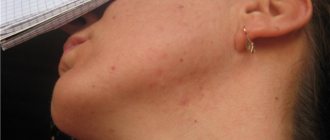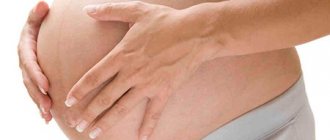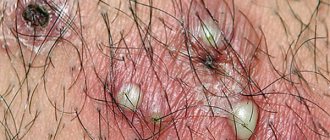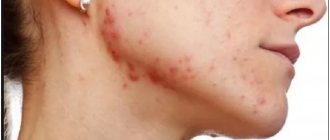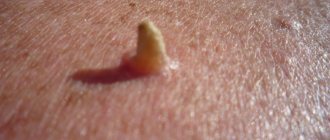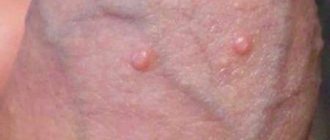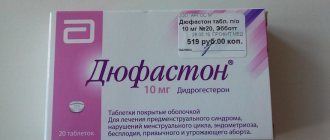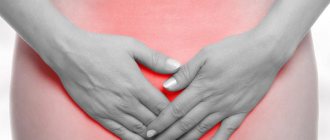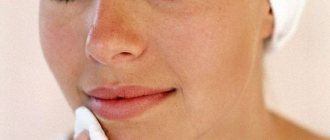03/26/2018 Category: Diseases and complicationsAuthor: Anastasia Pashchenko
During pregnancy, the state of each woman's body is unique. Some do not notice any special changes in their health and easily endure all nine months of pregnancy, while others experience a lot of inconvenience and discomfort from the first days of expecting a baby. The formation of acne during pregnancy is one of the unpleasant accompanying phenomena during this period, which indicates the beginning of hormonal and physiological changes in the body. In addition to emotional distress due to the unaesthetic appearance of the skin, a woman may also experience pain from acne. In such a situation it is necessary to treat them, but it must be done correctly.
- Localization of acne
Photo gallery: locations of acne in pregnant women
- Proper nutrition
Video: using cosmetics during pregnancy
- Reviews about getting rid of acne using traditional methods
Why do rashes occur during pregnancy?
The skin reflects the condition of the internal organs. Carrying a child is stressful for a woman. Acne on the body during pregnancy indicates that the body is adapting to new conditions. The functioning of all systems during this period is aimed at preserving the fetus. The formation of acne during pregnancy is one of the possible responses of the immune system to stress on the body. Neoplasms appear suddenly and often go away on their own.
Doctors identify the following causes of pathological changes in the skin during pregnancy:
- surge of hormones;
- lack of fluid;
- genetic predisposition;
- physiological feature;
- lack of fresh air;
- disturbance of mental balance;
- lack of physical activity;
- sleep disturbance;
- poor nutrition;
- neglect of hygiene;
- infectious diseases;
- exacerbation of chronic skin diseases.
Rashes during pregnancy may appear due to a surge in hormones
It is impossible to give an exact answer to the question of why the condition of the epidermis worsens in pregnant women. First of all, the pathological process is associated with hormonal imbalance. The skin becomes covered with inflamed growths due to the active production of progesterone. This is a hormone necessary for the implantation of the embryo in the uterus. The amount of progesterone in the blood increases at the beginning of pregnancy. Due to hormonal activity, the epidermis becomes oily. Excess sebum is one of the possible causes of rashes.
Dehydration provokes changes in the skin. To remove progesterone from the body, you need to consume a lot of clean water. Excess hormone leaves the woman's body along with urine. If a pregnant woman drinks little fluid, the liver uses internal water reserves. The body loses moisture, and acne becomes a consequence of this process. Violation of the drinking regime is the second most common reason that the body is covered with neoplasms.
Women who have a genetic or physiological predisposition to skin problems should be prepared for an exacerbation of skin rashes. Pimples during pregnancy occur due to nervous shock, chronic lack of sleep, and consumption of junk food. It is important for expectant mothers to do special gymnastics. Physical activity helps enrich the body with oxygen. Thanks to this, emerging tumors disappear quickly.
In what places do rashes most often occur?
The skin shows the condition of specific organs. Acne occurs primarily on the face during pregnancy. This zone contains points responsible for the functioning of the reproductive, respiratory and digestive systems. The inflammatory process is noticeable on the chin during pregnancy. This is explained by the fact that the epidermis of the lower part of the face reflects the nature of the functioning and condition of the uterus and appendages. Acne on the chin during pregnancy warns of possible inflammation of the genital organs or the development of candidiasis.
Acne during pregnancy can occur on the forehead, cheeks and nose area. The location of the tumors does not matter. The main thing is not to squeeze out the pus, do not pick off dry crusts and wash your face several times a day with cool water. It is better to do cosmetic facial cleansing before pregnancy, so that during a crucial period of life the skin is not exposed to aggressive influences.
Each woman has a different intensity of sebum secretion in certain areas of the body. Acne on the back during pregnancy is not uncommon. Sometimes such rashes are associated with decreased immunity during the cold season. Acne can cover the shoulders, shoulder blades, and lower back. This problem is especially relevant for obese women carrying a child.
Acne on the chest during pregnancy is diagnosed in 70% of women. Small rashes. There are many of them, but inflammation rarely occurs. The presence of acne in the mammary glands is a dangerous symptom. In this case, the rash that appears must be properly treated so that extensive inflammation does not develop. If a purulent disease occurs, the baby will not be able to breastfeed.
Acne on the abdomen during pregnancy is rarely diagnosed. They indicate a possible allergic reaction. Sometimes the cause is problems with the liver or gall bladder. The occurrence of acne on the abdomen during pregnancy is often associated with common heat rash. To exclude allergies and pathologies of internal organs, it is recommended that a pregnant woman go to the doctor.
If there are pimples on the butt, this indicates heat rash, a reaction to contact with underwear, or a possible infection. Neoplasms that do not pose a threat do not bother the woman. If pimples on your butt hurt and break out, you need to see a doctor. The inflammatory process can negatively affect the development of the fetus.
Preventive actions
Following some simple rules will allow you to forget about acne on your buttocks forever. First of all, this concerns hygiene.
- It is necessary to change underwear daily, and bed linen at least once a week.
- Make adjustments to your wardrobe. You should not wear tight trousers or skirts or tight trousers. Clothing and underwear should be made of breathable fabrics.
- In cold weather, avoid hypothermia.
- When working sedentarily, be more often distracted by stretching a little and walking.
- Do exercises, be outdoors more often.
Take care of your skin, preventing it from drying out. Use milk or lotion after shower. Baby oil applied to damp skin moisturizes well. Use peelings or scrubs.
What causes acne on the genitals?
In the intimate area, the skin is especially delicate. Any damage to the epidermis can lead to inflammation and rash. A pimple in an intimate place causes significant inconvenience to a woman. The tumor hurts, itches, and breaks out. The situation is complicated by constant contact with underwear. If a pimple appears on an intimate place after shaving, there is no need to worry. During pregnancy, the epidermis becomes too sensitive. Even if before pregnancy the skin did not react negatively to depilation, after fertilization the situation often changes.
Pimples on the labia during pregnancy are a dangerous symptom that warns of a serious pathology. Rashes indicate the activity of viruses or sexually transmitted infections. In this case, the pregnant woman experiences additional symptoms:
- purulent vaginal discharge;
- pain in the lower abdomen;
- weakness;
- fast fatiguability;
- discomfort in the intimate area;
- itching and burning in the labia area;
- increase in body temperature to 37°C.
A pimple on an intimate place brings significant inconvenience to a pregnant woman.
A pimple on an intimate place can be a sign of herpes type 2. The disease is dangerous and requires therapy. Infection with herpes occurs both before pregnancy and during pregnancy. The pathology is introduced into the body through sexual contact with a partner who is a carrier of the virus. For a long time, herpes does not manifest itself in any way. If a woman infected with the virus has not previously had acne in the labia area, she may develop acne during pregnancy. This is not dangerous for the fetus, since the placenta is a reliable protection. A child can become infected with such acne during natural childbirth, so women with type 2 herpes undergo a cesarean section.
If pimples appear in the labia area, this may indicate the presence of HPV (human papillomavirus). The rashes have the shape of condylomas. If the outer or inner labia are sprinkled, you need to contact a gynecologist.
Neoplasms of this nature are removed surgically. In some cases, papillomas and condylomas are a temporary phenomenon. Women often confuse these growths with ordinary acne and wait until the skin recovers on its own. This tactic of behavior is fundamentally wrong. The earlier therapy is started, the less likely it is that the fetus will become infected during natural childbirth.
The appearance of acne in early pregnancy
Carrying a child is divided into periods called trimesters. Changes in a pregnant woman's body occur gradually. At the very beginning there is an internal restructuring. A huge amount of progesterone is released into the blood. Acne during early pregnancy is a common occurrence. A hormone that promotes the consolidation and development of the fetus in the uterus, affects the functioning of internal organs. The increased load on the liver and kidneys affects the condition of the epidermis. Because of this, acne occurs in almost all women in the early stages of pregnancy.
The body of each representative of the fair sex is individual. Therefore, the localization of tumors is different. Rashes appear on the face, back, abdomen, chest, etc. If a woman had skin problems before conception, they may worsen during pregnancy. Pregnancy in the early stages is a direct indicator of acne or acne. The body tries to adapt to new conditions in this way. Sometimes, through purulent neoplasms, toxins and waste are removed so that the load on the liver and kidneys is reduced.
Acne begins to subside at the beginning of the second trimester. However, this does not happen for all women. In some cases, a small rash on the chest and face lasts a long time. Acne during pregnancy can cause a lot of trouble. In the first months of bearing a child, a woman’s psychological state is unstable. Having acne makes the situation even worse. A pregnant woman is worried that acne is ruining her appearance. It is important to understand that the situation will change soon. In most cases, therapy is not even needed.
conclusions
Rashes on the face and body of a pregnant woman require special care. Due to a number of contraindications, you should follow a special diet, maintain hygiene and not self-medicate. If the inflammation is isolated, it can be easily localized, dried, and it will go away on its own. If your face and body are “attacked” by acne, you should consult a specialist. It’s better not to go to a cosmetologist, but to consult with your doctor, and then acne during pregnancy, especially in the early stages, will quickly disappear from your beautiful face.
What do rashes in the third trimester indicate?
When the moment of labor resolution approaches, the body actively prepares for this process. During this period, specific manifestations arise that were absent previously. Some women experience rashes not in the first trimester, but before childbirth. The amount of acne and the condition of the skin during this period frighten many women. The rash covers the face, chest, back, and stomach. Foci of inflammation are found in the scalp. Because of this, the curls quickly become dirty.
Before giving birth, it is especially important to carefully monitor hygiene. A large amount of sebum is secreted through the epidermis. This is a consequence of the body preparing for childbirth. During this period, you should not use aggressive cosmetics or resort to professional procedures in a salon. In late pregnancy, hormones surge. In some cases, its intensity exceeds the changes that occur at the very beginning of gestation. Neoplasms most often affect the face. This scares women, but there is no need to worry. After childbirth, the skin is completely regenerated.
Before childbirth, it is especially important to carefully monitor hygiene
Women often wonder why the rashes go away in the second trimester, but appear again at the end of pregnancy. This can be explained physiologically. The first trimester is a period of restructuring of the body. The internal organs are under stress and this affects the skin. The second trimester is a calm phase. The body has already adapted to the new conditions, all resources are aimed at maintaining pregnancy. The third trimester is again stressful, as preparations for childbirth begin. Some women may develop a rash on their body again at the end of pregnancy.
How dangerous is acne during pregnancy?
Women carrying children are concerned about how rashes on the body affect their health. Acne on the face during pregnancy does not pose a threat to the expectant mother and baby. Rashes can take the form of acne, blackheads, or small white rashes. If there is increased fat content of the epidermis, then the appearance of acne is associated with hormonal activity. This does not affect the development of the fetus. With a 70% chance, every woman expecting the birth of a child will develop a rash.
If the rash causes discomfort, you should consult a doctor. The presence of acne on the body may indicate allergies, shingles, herpes, etc. Some pathologies, the symptom of which are rashes, are dangerous for the pregnant woman’s body and negatively affect the development of the fetus. If your face, back, chest or stomach are covered with pimples that cause itching and burning, a comprehensive diagnosis of the body is necessary.
If the rash causes discomfort, you should consult a doctor for help.
Pregnancy is stressful for the body. Chronic pathologies often worsen during this period. The danger comes from rashes that are accompanied by additional unpleasant symptoms:
- increased body temperature;
- pain in the area of pimples;
- itching and burning;
- deterioration of general health;
- indigestion.
Rashes in the genital area are dangerous for women and children. Often this rash is a sign of HPV or herpes. A baby passing through the birth canal can become infected with a dangerous pathology from its mother. To prevent this from happening, the doctor decides to remove the tumors surgically or prescribe a cesarean section.
Basic information
If before pregnancy a woman’s skin was subject to rashes in the form of pimples or acne, then in an interesting situation the problem will worsen even more.
Those with clear and normal skin are also not spared from the possible occurrence of similar troubles.
Therefore, before planning a pregnancy, you should definitely discuss preventive measures and treatment of possible skin rashes with a specialist.
When a dermatologist prescribes an ointment for acne on the woman’s face, effective help will consist not only in its use, but also in the application of the entire range of preventive measures.
What to do if a boil occurs?
Common skin rashes are common to many pregnant women. The situation with boils is much more complicated. This is a purulent inflammation of the hair follicle. The neoplasm hurts, ulcerates and poses a threat to the health of the mother and fetus. A boil during pregnancy occurs due to decreased immunity. The appearance of such an abscess is also associated with hypothermia, infection, failure to comply with personal hygiene rules, etc.
There are 3 stages of boil development during pregnancy:
- Formation of infiltrate. A compaction forms under the epidermis. The skin becomes inflamed and painful sensations occur.
- Maturation of the abscess. The process is accompanied by a temperature of +38…+39°C, which is extremely dangerous for a pregnant woman. Severe intoxication of the body begins. The stage lasts up to 6 days.
- Discharge of pus. When the boil is fully mature, the skin breaks through. The pus comes out.
Sometimes the doctor prescribes surgical excision of the abscess to prevent an abscess. A boil during pregnancy is dangerous because it causes severe intoxication. The accumulation of harmful substances negatively affects the development of the fetus. There is no need to wait for the pus to drain on its own. To avoid serious consequences, you must consult a surgeon and follow all medical instructions.
How to treat?
Often, abscesses, boils and even some diseases of sexually transmitted etiology are masked under acne. Therefore, at the slightest suspicion, you should immediately consult a specialist doctor to diagnose the disease and select appropriate therapy. If only the problem of the dermis is hidden under the inflammatory elements, then treatment can be based on:
- cauterization with salicylic acid (do the procedure for at least 5 days);
- daily application of tea tree oil after bathing;
- periodically lubricating pimples on the butt with iodine solution (spot on 3 times a day);
- taking baths with the addition of a decoction of medicinal herbs (chamomile, chicory, horsetail, celandine, calendula) to the water;
- using tar soap (local treatment is more appropriate, since soap is very drying);
- using a mask made from cosmetic clay diluted with water (preferably green) with the addition of wheat germ oil (this remedy can be used for single pimples and when the entire butt is covered in pimples);
- drying the skin with baby powder (if the rash is caused by excessive sweating).
Pharmaceutical drugs are certainly effective in therapy. So, if pimples have appeared on the butt, the desired result will be given by such medicines as Dalacin (gel), Zinerit (ointment, lotion), Skinoren (cream, gel), Curiosin (solution, gel). The use of these and other medications must be agreed upon with a dermatologist. Before use, it is also important to study the instructions to become familiar with the contraindications.
Therapy during pregnancy
Recommendations for eliminating acne during pregnancy
You need to get rid of the rash during pregnancy correctly. While expecting a baby, women are interested in how to treat acne during pregnancy. First of all, you need to remember what you should never do. Gynecologists categorically prohibit pregnant women from using cosmetics based on salicylic acid. The main substance is absorbed into the blood and can harm the fetus.
This method of dealing with the rash, such as squeezing, will also not work. Hands can cause infection and cause extensive inflammation. It is necessary to carefully study the instructions for cosmetic products. If the product cannot be used during pregnancy, the manufacturer must indicate this.
Breakouts caused by a surge of hormones will not be eliminated by anti-acne creams and gels. In this case, only time contributes to the disappearance of neoplasms. You can only reduce inflammation and prevent the appearance of new pimples. It is allowed to use cosmetics that contain fruit acids.
A pregnant woman should pay attention to her diet
The treatment of acne during pregnancy needs to be approached comprehensively. Dermatologists together with gynecologists give the following recommendations:
- Eat healthy foods. The diet should mainly consist of fresh fruits, vegetables and cereals.
- Maintain drinking regime. Drinking enough clean water is the key to the coordinated functioning of all organ systems and healthy skin.
- Keep your body clean. You need to choose the right cleanser. It is important to ensure that there is no excess sebum on the face and body.
- Support bowel function. Digestive problems during pregnancy are not uncommon. This entails the appearance of pimples. Therefore, you need to consume natural yogurts, kefir, and starters daily.
It is important to know how to treat acne during pregnancy. For women expecting a child, medications that contain the following components are contraindicated:
- benzene peroxide;
- aromatic steroids;
- steroids;
- antibiotics.
The popular and effective remedy Zinerit is contraindicated for acne during pregnancy. It contains antibiotics, so it has a detrimental effect on the fetus. Before purchasing a specific cosmetic or medical product, you need to carefully read the ingredient list.
Treatment options
Pimples during pregnancy can be treated, especially if they cause discomfort or pain. But it should be borne in mind that not all treatment methods are suitable for pregnant women - the main factor in choosing a remedy is its safety for the unborn child.
Proper nutrition
If a single pimple or rash appears on any part of the body, the first thing you need to do is adjust your diet. During pregnancy, it is advisable not to eat hot, spicy, salty or sweet foods. You should add healthy foods to your daily diet: fruits, vegetables, herbs, fish, lean meat, dairy products. If the amount of vitamins in food is insufficient, then it should be replenished by taking additional vitamin complexes for pregnant women.
The diet must also be observed: it is not recommended to allow overeating and attacks of hunger - these conditions of the body lead to disruption of the digestive organs.
A healthy diet reduces the risk of acne
Poor nutrition during pregnancy can lead not only to the appearance of acne, but also to changes in blood pressure, edema, and impaired placental circulation!
Selection of decorative cosmetics
Many women, being pregnant, cannot refuse to use decorative cosmetics. In this case, you should make sure that cosmetics do not cause allergic reactions, dermatitis, or age spots. You should also pay attention to the composition - it is better to give preference to cosmetics with natural ingredients without dyes and fragrances. It is strictly forbidden to use products that contain salicylic acid, parabens, hormones, peroxides, retinoids, flatates, benzene, or steroids.
You should not use cosmetics that have expired.
If possible, it is necessary to avoid mattifying products: powder, corrector, foundation - they clog the skin, not allowing it to breathe, which subsequently leads to single or massive popping out of pimples.
Mascara and light lip gloss, when used in moderation, will not harm the health of the expectant mother and her child.
Video: using cosmetics during pregnancy
Pharmacy products
During pregnancy, many medications are contraindicated. Particularly dangerous are products containing antibiotics and hormones. It is also undesirable to use products containing alcohol. All these substances can have a detrimental effect on the development of the unborn child.
During pregnancy, it is not prohibited to use Skinoren gel on any area of the skin, provided there are no discomfort (allergies).
Other possible medications for getting rid of acne can be used only after being prescribed by your doctor.
Treatment with pharmaceutical products during pregnancy is possible only after the recommendation of a doctor!
Folk remedies
In the fight against acne, popular folk remedies include honey, lemon, herbs, baking soda, and more. The main condition for using these ingredients is the absence of allergies. Some recipes to help get rid of pimples:
- Herbal mask of calendula and chamomile. It is necessary to brew the plants in equal proportions, and then apply the cooled mixture to the face. Chamomile and calendula have anti-inflammatory properties, soothe the skin, relieving pain, and also dry out acne, promoting faster skin healing.
- Cinnamon and honey mask. Ground cinnamon should be mixed with honey in a 1:1 ratio. It is recommended to apply the mask directly to problem areas of the skin and keep it on the face for several hours.
- Horseradish and apple mask. Grate and mix the ingredients in equal proportions, apply to the face and keep for about half an hour a day.
- Ice cubes. You can freeze both plain clean water and herbal decoctions or juices of fresh berries and fruits. It is recommended to wipe your face with an ice cube every day - this procedure helps to narrow pores and relieve skin irritation.
- Clay masks. Dries acne on the skin. Their use is not prohibited during pregnancy.
- Mask with soda. A small amount of baking soda must be diluted with warm water to a paste consistency and applied to problem skin for 15–20 minutes. This mask is not suitable for frequent use!
- Rubbing the skin with a fresh vegetable or berry. A piece of cucumber, pumpkin or strawberry is ideal for this recipe. Vegetable cuts must be fresh and clean. When using the berry after the procedure, you must wash your face with warm water.
There are a considerable number of traditional medicines for treating acne. Any of the recipes can be effective - everything is individual!
When treating with folk remedies, it is necessary to exclude allergies to components in a pregnant woman.
Reviews about getting rid of acne using traditional methods
Girls, try ice cubes. I wipe my face with them, even when my skin is fine. Just brew some herbs (chamomile, celandine, St. John's wort), steep and pour into molds. In the morning, you take out such a cube and wipe your face. Even as a preventive measure it is very effective. Well, we do masks once or twice a week. But we wash them off not with ordinary water, but with vinegar (per 1 liter - no more than 1 spoon). Plus wash your face with some herbal decoction diluted with warm water.
Elena
https://www.colady.ru/prichiny-pryshhej-pri-beremennosti-sredstva-ot-pryshhej-dlya-beremennyx-zhenshhin.html#3
An egg mask helps me.) You need to beat the chicken protein until foamy, pour in aloe juice (about a spoon, no more) and apply this mixture evenly over your face. Let it sit for half an hour, then wash it off and apply some medicinal cream on top (which the doctor allowed). In principle, you can even just lubricate it with aloe juice. Just a lot of fuss - first wash the leaves, then dry them, then put them in paper (dark color!))) in the refrigerator for a week and a half. Well, then squeeze out the juice and smear it on.
Ekaterina
https://www.colady.ru/prichiny-pryshhej-pri-beremennosti-sredstva-ot-pryshhej-dlya-beremennyx-zhenshhin.html#3
I wash my face with tar soap, then wipe my face with calendula tincture. On top I apply “clean line” chamomile and strawberry cream. In the morning and in the evening. Very good effect.
Natasha
https://www.baby.ru/community/view/126291/forum/post/3877228/
What is forbidden to do if acne forms during pregnancy?
While expecting a baby, you should consciously choose treatment methods that are safe for the child. There are some ways to get rid of pimples that are prohibited during pregnancy:
- use of laser and phototherapy;
- use of chemical peels and scrubs;
- squeezing pimples;
- facial cleansing in a beauty salon.
All prohibited procedures during pregnancy can have a negative impact on the fetus. Therefore, it is better not to risk the health of the unborn baby!
How to get rid of acne during pregnancy?
You can find many pharmaceutical acne treatments on pharmacy shelves. Ointments are selected by a gynecologist or dermatologist. Most effective drugs are prohibited during pregnancy. The choice of a specific remedy is made taking into account the duration of pregnancy, the individual physiological characteristics of the woman and the type of rash.
Doctors often prescribe Skinoren and Regetsin gels to patients. These drugs are applied to the face, back, chest, and abdomen. If there are few acne, you can apply the products pointwise. If the rashes are small and cover most of the skin, the gel is spread in a thin layer over the entire surface of the affected epidermis. If burning or itching occurs, the drug must be washed off. An allergic reaction is possible.
Sometimes the doctor prescribes the use of creams with anti-inflammatory and antibacterial effects. There are special products that are allowed for pregnant women. One of these drugs is Eplan cream. A specialist may also prescribe Kvotlan ointment. These medicinal products do not contain aggressive or prohibited components, so this therapy is completely safe for a child.
You can treat acne during pregnancy using folk remedies. Lotions with a decoction of herbs help well: chamomile, calendula or string. Pimples on the forehead during pregnancy will become less noticeable if you wipe the affected skin with ice cubes 2 times a day. A mask of honey and cinnamon has a great effect on the condition of the epidermis.
Women need to remember that only a doctor knows how to deal with acne during pregnancy correctly. If the rash affects the intimate area, you should immediately contact a gynecologist. If severe inflammation or even a boil occurs, you should go to a dermatologist or surgeon. During pregnancy, the main thing is not the aesthetic side of the issue, but the health and full development of the fetus. Therefore, you need to report all problems, including acne, to your doctor and work together with him.
What is prohibited?
During pregnancy, any manipulations with the skin that can lead to negative consequences are prohibited.
- If a purulent pimple appears on your face, what should you do? It is not recommended to squeeze it out, especially on the face.
- You cannot use medications and folk remedies that are prohibited for pregnant women.
- You should not constantly use foundation.
- It is not recommended to use products with components such as benzoyl peroxide and steroids.
